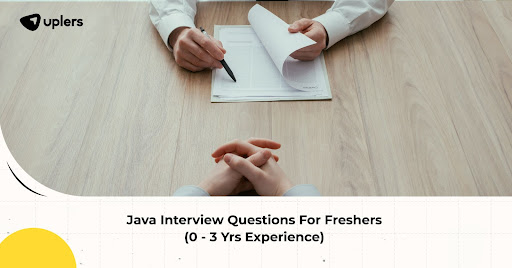Top 51 Java Interview Questions to Ask in 2023
- Siften Halwai
- August 11, 2023
- 11 Minute Read

According to the TIOBE Index, there are over 265 programming languages in the global software development market. It’s an apparent question as to why Java still holds the limelight.
After 26 years of experience, Java is not old-fashioned, irrelevant, or uncompetitive. Contrary to this belief, Java is still the most demanded, loved, and used programming language. Some of the popular platforms like YouTube, Amazon, and Spotify use Java. As organizations continue to seek Java professionals, a comprehensive evaluation consisting of relevant Java technical interview questions is paramount. This blog thus offers a curated list of the top Java interview questions to ask at various experience levels.
How A List Of Java Fundamentals Interview Questions Will Streamline The Hiring Process
As per Statista, Java constitutes 30.55% in the list of most used programming languages. Java is versatile and requires competitive expertise to steer ahead of the competition. Steering the hiring funnel in the right direction is the key to long-term success. Your manpower is the most valuable asset you have in your goal-attainment journey. This is where a checklist of these Java interview questions becomes paramount.
The ultimate end goal of an interview is to assess the skills and prowess of Java developers. The list of Java Developer Interview questions will serve as a guiding light in the assessment of the candidate’s knowledge, coding skills, and problem-solving abilities. When you know you have made the right hire you are bound to have an accelerated employee retention rate.
Now that you are familiar with the need for Java coding interview questions it’s time to bifurcate them as per experience level.
Java Interview Questions for Freshers
In the fierce competition, you need to be determined about what you are looking for in a Java professional. A list of the Java basic interview questions will prove to be helpful if you are looking for those new to the Java development world. This will include freshers or those with less than a year of track record.

The Java interview questions should be such that they reflect the developer’s foundational knowledge. The questions must be formulated around basic Java concepts, object-oriented programming, and simple coding challenges.
The following Java developer interview questions can be insightful when you hire Java developers for entry-level:
Explain your understanding of Object-Oriented Programming (OOP).
OOP is a programming pattern of organizing code into reusable and interconnected objects. Java incorporates key OOP concepts such as encapsulation, abstraction, inheritance, and polymorphism.
How does memory management work in Java?
Java Virtual Machine( JVM) supports memory management in Java. JVM allocates memory into 2 regions, heap memory, and stack memory when a program runs.
What are the features of Java programming language?
The popularity of Java is majorly due to its feature-rich interface which is simple, portable, secure, robust, and platform-independent.
State the significance of the main() method in Java.
The Main() method is the entry point for a Java application that is called to initiate the program execution. Its like a public keyword that that helps JVM identify the point of execution.
Why Java is regarded as a platform-independent language?
Java is independent of any hardware or software due to its compiler. It compiles the code and converts it into platform-independent byte code workable on multiple systems.
What is the final keyword in Java?
Final keyword is used with the class to ensure that no other class can extend it. The string class is an example to explain this Java interview question.
Why Java is not purely an object-oriented language?
Java is not a pure OOP as it supports primitive data types such as byte, boolean, char, short, double, etc.
How does Java differ from JavaScript?
A Java developer primarily focuses on building applications across distinct platforms. Whereas, when you hire JavaScript developer they focus on developing interactive web applications for an enhanced user interface within web browsers.
Name the 4 access modifiers in Java.
Access modifiers are keywords used to set accessibility to classes, methods, and other members. Public, protected, default, and modifier are 4 access modifiers.
Name a few Java collections.
A few renowned Java collection types include:
- ArrayList
- LinkedList
- HashSet
- HashMap
How do you handle exceptions in Java?
This is one of the crucial Java developer interview questions if you want robust and error-free code. Try-catch blocks is used for exception handling in Java. A code that raises an exception is enclosed in the ‘try’ block. The corresponding ‘catch’ block will handle an exception that occurs.
Difference between array list and vector in Java.
Array | Vector |
| 1. Fast as it’s non-synchronized. | 1. Slow as it’s thread-safe. |
| 2. Doesn’t define the increment size. | 2. Defines the increment size. |
| 3. Only the iterator can be used for traversing. | 3. Iterator and Enumeration both can be used for traversing. |
What’s your understanding of an instance variable?
This is one of the vital Java fundamentals interview questions that you shouldn’t miss asking. Instance variables can be accessed by all the methods in the class. They describe the properties of the object and are declared outside the methods.
What is the Java Reflection API?
The answer to this basic Java interview question is that it’s the ability to inspect and modify the behavior of any application during runtime.
What default values are assigned to variables and instances in Java?
No default values are assigned to variables in Java otherwise they will throw a compilation error. Thus, the answer to this Java interview question is values need to be initialized before use.
Can you call a constructor of a class inside another constructor?
Yes, this is possible via constructor chaining in 2 ways:
- Within the same class
- From the base class
What is data encapsulation?
It’s the OOP concept of hiding the data attributes and behavior in a single unit. This concept promotes the security of the private properties of an object.
These top Java interview questions will help you evaluate the following key candidate attributes:
- Conceptual knowledge
- Problem-solving skill
- Communication ability
- Familiarity with basic syntax
- Passion for continuous learning
Bonus Read: When you evaluate a candidate profile, you must know what questions to ask and what skills you are looking for. Having a list of the must-have Java developer skills can be a cherry on the cake. Alongside the listicle of core Java interview questions check out this article: 5 Skills Your Java Full-stack Developer Must Have in 2023 – Uplers to make an informed decision.
Java Interview Questions for Intermediates
As you advance to a more experienced candidate profile expectations will shoot up. A list of advanced Java interview questions is required for intermediate developers as they come with more exposure. Therefore, questions concerning multi-threading and other complex programming concepts come into play.

Java remains a cornerstone for software development endeavors. Thus, keep the following core Java interview questions handy when looking for an intermediate talent:
Difference between the `equals ()` method and the ` == ` operator in Java.
The `equals ()` method compares the contents of an object whereas the `==` operator compares the memory addresses of the objects. == operators are used for reference comparison whereas .equals() method for content comparison.
Mention the variants of JDK.
JDK stands as an abbreviation for Java Development Kit and has the following 3 variants:
- JDK Standard Edition
- JDK Enterprise Edition
- JDK Micro Edition
Why make strings immutable in Java?
The 4 reasons to answer this Java interview question are:
- Security
- String pool
- Multithreading
- Collections
How does Java manage multithreading?
Java supports multithreading by creating multiple threads of execution. The ‘Thread’ class and ‘Runnable’ interface facilitate this. To facilitate maximum CPU utilization this Java feature allows for concurrent execution of two or more parts of a program.
What is a JIT compiler?
JIT compiler refers to Just In Time compiler which takes the computer code in compilation during execution of the program. This is considered as a vital aspect that decides the performance of an application for the end-user as well as application developer.
Which of these will generate a compile-time error and why?
- int[] n1 = new int[0];
- boolean[] n2 = new boolean[-100];
- double[] n3 = new double[2241423999];
- char[] ch = new char[10];
Line 3 will display an error as an array requires size as an integer in 4 Bytes. The integer number in this case is too large.
What is Exception Chaining in Java?
This principle allows one exception to be wrapped or nested within another. This preserves the history of your exceptions for better error handling.
State the types of Access Specifiers.
Access Specifiers are predefined keywords that come in 4 types:
- Public Access Specifier
- Private Access Specifier
- Protected Specifier
- Default Specifier
What is the meaning of a Comparator in Java?
The answer to this Java interview questions for 5 years experience is quite simple yet pivotal. It’s a Java interface that contains the compare method where we can define on what basis we need to compare the values.
How is dependency injection achieved in Java?
Dependency injection (DI) is a design pattern where objects are inserted into a class rather than having the class create them itself. DI is attained via frameworks like Spring in Java.
What is the difference between HashMap and HashTable in Java?
Let’s answer this Java coding interview question with the help of a table.
HashMap | HashTable |
| 1. Better for non-threaded applications as it’s unsynchronized. | 1. Suited for threaded applications as it’s synchronized. |
| 2. Only allows one null key. | 2. Doesn’t allow null in keys or values. |
| 3. Supports order of insertion. | 3. The order of insertion is uncertain. |
How many constructor types are used in Java?
2 constructor types are broadly used in Java that is:
- Parameterized constructors
- Default constructors
Comment if static as well as private method overriding is possible in Java.
The answer to this Java interview question is False. This is because static methods have no relevance to the objects. Also, these methods are of the class level.
Can a constructor return a value?
A constructor is a special type of function that is called to create an object. By replacing a class’s current instance implicitly, a constructor can return a value. However, it can’t be done explicitly.
Explain the ‘super’ keyword in Java.
It’s a reference keyword for immediate parent class objects in Java. To gain an understanding of this you need to be familiar with Inheritance and Polymorphism.
What is Method Overloading in Java?
Creating multiple method signatures with one method name is called Method Overloading. Different methods can have the same name, but different signatures can differ by the number or type of input parameters.
Is it possible to overload a static method?
No it’s not possible. Overriding is a feature of OOP languages like Java that is related to run-time polymorphism. The process will render an error saying “static method can’t be referenced.
These top interview questions for Java will help you evaluate the following key candidate attributes:
- In-depth familiarity.
- Technical proficiency and soft skillset.
- Code optimization.
- Architectural know-how.
- Communication and collaboration.
Java Interview Questions for Experts
As per GitHub language statistics, Java occupies the second position among other programming languages. This is because, in the development ecosystem that is propelled by new business demands occasionally, Java outperforms it’s counterparts. Additionally, the future development trends hold a promising future for Java.

As a result, the demand for Java experts is snowballing and you need this list of Java interview questions for 10 years experience to find a qualified hire:
How does JVM optimize code execution?
JIT compilation assists in optimizing JVM code execution by compiling Java source code to bytecode. During runtime, this is translated into native machine code with the help of the JIT compiler resulting in agile execution.
What does JDBC implicate?
It’s an abbreviation for Java Database Connector used to institute connectivity between an existing database and a Java application. This application programming interface defines how a client may access a database in Java programming language.
Difference between the ‘new’ operator and the ‘newInstance()’ operator.
The answer to this Java coding interview question depends on the familiarity of the class name when creating objects. If you already know the class name then a new operator is used. In the case, where the class name to create the object is unknown newInstance() operator is used.
What is a marker interface?
This is a design pattern in Java that provides external means to add metadata in the run-time information of objects. Serializable interface is a good example to understand this.
Name the various directives in JSP.
There are majorly 3 variants of JSP namely:
- Include directive
- Page directive
- Taglib
Can the memory limit be exceeded in a program despite a garbage collector?
This is a Java interview question for experienced developers. Although garbage collector gives it’s best to reclaim memory memory limit can still be exceeded. This happens when the garbage collector can’t free enough memory for the application to continue.
What is CountDownLatch in Java?
This terminology in Java stands for a synchronizer that allows one or more threads to wait for another before starting the processing. This simplifies the development process significantly. Thus, it’s one of the most important Java interview questions often asked by every recruiter.
What is session management in Java?
A session is a dynamic state of random conversation between the client and the server. A session ID is established for the virtual communication channel including a string of responses and requests from both parties.
State the 5 phases of the Java thread lifecycle.
Phases in the Java thread lifecycle are as follows:
- New
- Runnable
- Running
- Non-Runnable
- Terminated
What is a volatile keyword in Java?
Volatile keyword is used in conjunction with variables and all threads read its value directly from the memory location without caching it. This is another way of making class thread-safe so that it can be used by multiple threads at the same time without any problem.
Briefly explain JPA in Java.
Java Persistence API (JPA) is used to create a persistence layer for desktop and web applications. It mainly deals with the following:
- Java Persistence API
- Query Language
- Java Persistence Criteria API
- Object Mapping Metadata
Can you import the same class or package twice in Java?
The answer to this Java interview questions experienced is a yes. But, it’s also redundant as JVM internally loads the package or class only once.
Can we have an empty catch block?
Although the answer to this senior Java developer interview question is a yes, it’s not considered the right way of programming. This is because if it catches any exception we will be left with no information on the exception. As a result, debugging can be a challenge.
State the primary difference between System.out, System.err, and System.in.
System. out displays normal messages while System.err displays error messages. System.in by default represents the standard input device which is the keyboard.
What is the result of an exception being thrown by the main method?
In such a scenario, the Java Runtime Environment terminates the program and prints the exception message stacked in the system console. This clause only states that the method throws a FileNotFoundException and the calling method should catch or rethrow it.
Explain the difference between an instance variable and a local variable.
Instance variables are declared in a class but local variables are declared within the blocks of code. Instance variables are given default values that is null and 0, whereas, local variables don’t get default values and need to be explicitly initialized.
What is a String Pool in Java?
It’s a storage age in the Java heap mainly used for storing the string. It’s also known as String Intern Pool or String Constant Pool. One purpose is to store String objects created using literals.
These core Java interview questions for experienced developers will help you evaluate the following candidate attributes:
- Advanced knowledge.
- Problem-solving mastery.
- Ability to face complex challenges.
- Architectural intellect.
- Remarkable non-technical skills.
Wrapping Up
In the dynamic world of Java development identifying the right candidate is a multi-faceted endeavor. A well-structured list of Java interview questions can help streamline your hiring funnel and shortlist the cream of the crop. It’s an indispensable recruitment phase regardless of a virtual workspace or an in-office role.
It’s also important to note that before the interview questions and skill assessment, you need to look in the right place for quality talent. Amidst the widening talent gap, finding technically proficient, highly expert, and skilled Java talent is not a cakewalk. Hiring managers are therefore preferring to hire Java developers from India. This addresses the talent crunch cost-effectively but can be time-demanding.
As a result, global hiring partners like Uplers can eliminate the majority of the remote hiring hassle. From sourcing candidates to having a Java developer remote contract in place, we take complete accountability. With over a decade of experience, Uplers is a platform that connects recruiters from 180+ Countries to a network of 200,000+ talents, pre-vetted against their technical capabilities, language proficiency and behavioral skills. We ensure you get the best Java development team at up to 40% cost-savings and 10x hiring speed.
By bridging the gap between global talent and business needs we matchmake the top 3.5% of pre-vetted candidate profiles. Get on a hassle-free remote recruitment journey with Uplers and propel your software development project to new heights. We are not just any recruitment agency, but your one-stop hiring partner for success!


Thank you for submitting the details!
We will keep your information safe. Feel free to contact us with any questions at hello@uplers.com
Please check your email for next steps shared by Robert.














